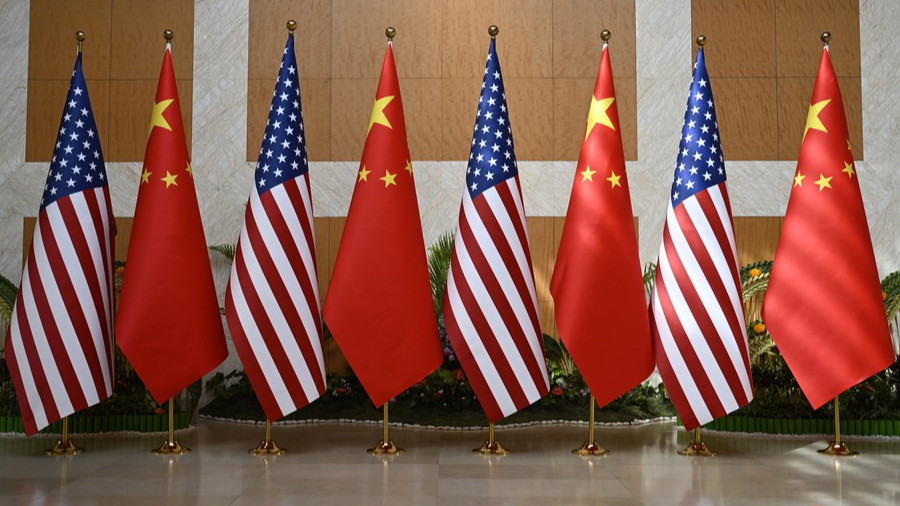
The national flags of China and the United States. [Photo/Xinhua]
By William Jones
U.S. Secretary of State Antony Blinken will be visiting China this week as a part of the high-level visits agreed upon by U.S. President Joe Biden and Chinese President Xi Jinping at their meeting in San Francisco last November. The welcome mat will, of course, be placed out for Secretary Blinken, although the discussions that follow will not be free from a good deal of tension given recent measures threatened by the U.S.
All this does not bode well for pleasant conversations as Blinken arrives in Beijing. But the purpose of such high-level exchanges is not to celebrate agreements achieved, but rather to deal with the issues of major controversies in such a way that they do not lead to conflict. The question will be whether the talks with the Secretary will help alleviate these tensions.
In the aftermath of U.S. Treasury Secretary Janet Yellen's five-day visit to China, the U.S. President has threatened new tariffs on Chinese steel and the U.S. trade office has begun a "probe" into Chinese shipbuilding. In addition, President Biden held the first trilateral summit between the U.S., Japan and the Philippines in April, creating the basis for trilateral military cooperation, clearly aimed at the rise of Chinese influence in the region. The U.S. is also threatening to place medium-range missiles in the Philippines which could strike at Chinese targets on the mainland. Discussion with the U.S.' top diplomat could help lessen the tensions created by these latest measures from the U.S. side, if this is at the top of his agenda.
Most recently, the U.S. has also begun a campaign in order to create a rift in the all-important China-Russia relationship. At the recent G7 Foreign Ministers' meeting in Capri on April 19, Secretary Blinken had urged the other G7 ministers to increase pressure on their Chinese counterparts to cut off significant trade with Russia, even threatening to impose sanctions on companies which they judge to have supplied vital equipment to Russia. These are not military items which are being targeted, but rather items like machine tools and other equipment which can help build home appliances as well as tanks. Blinken would be sadly mistaken if he made this his recurring theme during his Beijing visit.
U.S. diplomacy seems to have forgotten all the lessons of wise U.S. statecraft. The wisdom garnered from the earlier foreign policy traditions of the likes of former presidents John Quincy Adams and Franklin Roosevelt seem to have completely disappeared from American diplomacy. Yet none of the wars conducted by the U.S. during their rather short period of assuming the role of the sole "superpower" after the break-up of the Soviet Union have ever been consented to by the American electorate.
The world, however, is no longer subject to U.S. dictates. NATO's Ukraine debacle has clearly shown that there are other forces in the world, prepared and capable of defending their own legitimate interests. Neglecting to take those into account can lead to serious miscalculations that will cost much blood and treasure.
In addition, the world no longer marches to the tune of U.S. policy prerogatives. Even Europeans are becoming wary of the more muscular policy of the U.S. in Europe, as well as in the Asia Pacific, as was seen in the successful visit of German Chancellor Olaf Scholz to Beijing, who put German economic and political interests above the nit-picking required by the Anglo-American playbook.
So while the welcome mat will be there for the U.S. Secretary, so will difficult discussions. Hopefully, they can lead to some alleviation of the tensions created by the recent moves. A total resolution of the tensions will require further discontent with U.S. foreign policy among the general public. We can already see signs of this in the growing public uproar over U.S. military support for Israel in its severe conflicts with the Palestinians.
Among the U.S. public, the imperial pretensions of the U.S. political elites have never taken root. While a form of "crisis management" is still the order of the day in the China-U.S. relationship, a complete resolution of the tensions will not be had until that "sleeping giant," which is the American population, begins to make itself felt in the foreign policy arena.
William Jones, a special commentator on current affairs for CGTN, is the former Washington Bureau Chief for Executive Intelligence Review (EIR) News Service and a non-resident fellow of the Chongyang Institute for Financial Studies.

 中文
中文



